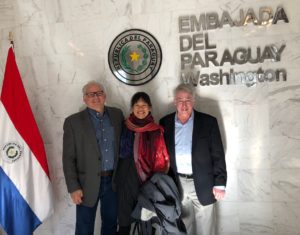The [CII] Resolved ISM in STar-forming galaxies with ALMA (CRISTAL survey) peered back to when the Universe was only about one billion years old – a mere toddler in cosmic terms. These observations are helping scientists understand how galaxies formed and evolved from primordial gas clouds into the organized structures we see today.
Recent News
NSF NRAO Leads Critical Spectrum Studies to Safeguard Radio Astronomy
The U.S. National Science Foundation National Radio Astronomy Observatory (NSF NRAO) has received funding to expand its study of an invisible—and crucial—scientific and technological resource: the radio spectrum.
Largest Oort Cloud Comet Ever Observed Reveals Its Secrets with ALMA’s Powerful Gaze
A team of astronomers has made a groundbreaking discovery by detecting molecular activity in comet C/2014 UN271 (Bernardinelli-Bernstein)—the largest and second most distantly active comet ever observed from the Oort Cloud.
Around the World in 8 meetings
AUI and AWB travel the Embassy Circuit to Bring New Opportunities to South America
Washington DC – A casual stroll down Embassy Row can send a traveler from one continent to another in matter of seconds. Associated Universities, Inc. (AUI) and Astronomers Without Borders (AWB) recently made such a trip to bring a stellar experience to the students of South America. As part of an ongoing partnership to connect people worldwide through various aspects of astronomy, AUI and AWB are working together to disseminate eclipse glasses and educational resources globally to benefit children and educators most in need.
“The July 2, 2019 and December 2020 solar eclipse provides an amazing opportunity to enrich the STEM education of students near the path of totality,” said Dr. Mike Simmons, President of AWB, “and with the 2024 solar eclipse here in the U.S. on the horizon, we have the opportunity to further reuse and recycle eclipse glasses and educational content from the spectacular 2017 solar eclipse.” AUI and AWB have been working with embassy staff from countries in and near the 2019 path of totality to solve logistical challenges of shipping eclipse glasses, educational materials, promoting their use in schools, and charting an engaging course for AWB’s education outreach vehicle.
Astronomers Without Borders brings the world together to share their passion of astronomy and the wonders of the Universe. Support projects allow those in developed countries to share with others, making it possible for everyone to enjoy the wonders of the night, and daytime, sky. And in the process of looking outward together, we learn about each other and create lasting bonds, regardless of country or culture.

AUI and AWB meet at the Embassy of Paraguay. Pictured from left to right: Tim Spuck, AUI Director of EPE; Zoe Chee, AWB Program Manager; and Mike Simmons, AWB President.
“The embassies provide important opportunities to learn about the culture, STEM initiatives and needs, and opportunities for collaboration in countries around the world,” said Dr. Tim Spuck, AUI’s Director of Education and Public Outreach, “We are excited to work with Chile, home to the Atacama Large Millimeter/submillimeter Array observatory, and to forge and strengthen friendships in Argentina, Peru, Bolivia, Paraguay, Uruguay, and Brazil.” Associated Universities recognizes the importance of cultivating excellence, delivering value, enhancing education, and engaging the public. The AUI Office of Education and Public Engagement (OEPE) builds on decades of experience across formal and informal education and outreach, and the management of large complex science projects and facilities. Through the Office of Education and Public Engagement, AUI works to identify and develop initiatives that are innovative and potentially transformative in STEM-related education and outreach.
Recent News
ALMA Reveals Stunning Details of Infant Galaxies in the Early Universe
The [CII] Resolved ISM in STar-forming galaxies with ALMA (CRISTAL survey) peered back to when the Universe was only about one billion years old – a mere toddler in cosmic terms. These observations are helping scientists understand how galaxies formed and evolved from primordial gas clouds into the organized structures we see today.
NSF NRAO Leads Critical Spectrum Studies to Safeguard Radio Astronomy
The U.S. National Science Foundation National Radio Astronomy Observatory (NSF NRAO) has received funding to expand its study of an invisible—and crucial—scientific and technological resource: the radio spectrum.
Largest Oort Cloud Comet Ever Observed Reveals Its Secrets with ALMA’s Powerful Gaze
A team of astronomers has made a groundbreaking discovery by detecting molecular activity in comet C/2014 UN271 (Bernardinelli-Bernstein)—the largest and second most distantly active comet ever observed from the Oort Cloud.
